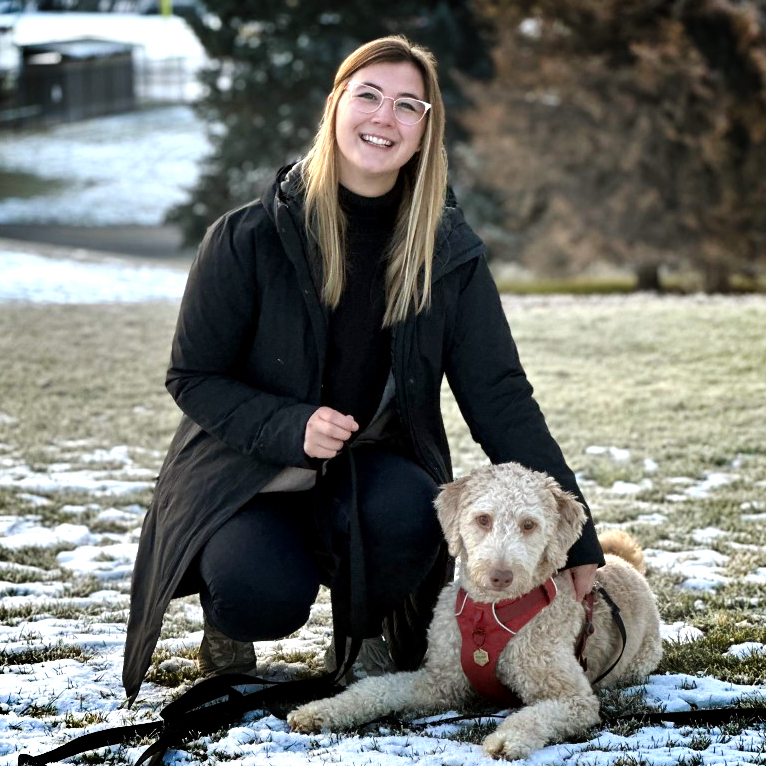AN INTERVIEW WITH KASSANDRA DINDINGER-HILL
Kassandra Dindinger-Hill, MS3 is completing a research fellowship with urologic oncology and mentors Alejandro Sanchez, MD and Brock O’Neil, MD.

Q. Where are you doing your medical training and what year are you in medical school?
I am a medical student at the University of Minnesota, currently between my 3rd and 4th year. This year I am working as a research fellow in urologic oncology at the University of Utah and I am planning on applying to urology residency programs in 2024.
Q. Why did you decide to take a year to complete the urologic oncology research fellowship?
I grew up in Alaska and I am Alaskan Native. My long-term career goals include returning to Alaska to serve Native people both clinically and through research. I chose to pursue the research fellowship to strengthen my research skills so that I will enter residency with a strong foundation to build upon while going through training. Spending this year focusing on research has been so important for my personal and professional growth and will ultimately help me fulfill my goal of working for Native people and Native communities once I graduate and become a practicing physician.
Q. What is the work that you are doing in fellowship and what have you found most exciting about the fellowship?
My primary research mentors each have a different focus. Dr. O’Neil has a strong focus on low-value care and healthcare services while Dr. Sanchez focuses on kidney cancer, body mass, and lifestyle factors. I am working on a few projects for Dr. Dechet involving quality of life and technical procedures. The varied interests of my mentors have been a bonus to my research year because it has allowed me to get involved in many different areas of research and I have learned so much in the process. My research mentors have also supported my personal research interests and I am currently working on a literature review on urologic cancer in Native people. The work that I do typically involves performing literature reviews, interpreting data and results, submitting abstracts, presenting at conferences, writing manuscripts, and submitting them for publication. The most exciting aspect of the fellowship is working on a project for several weeks and months and watching it transform, with a lot of work and care, into a manuscript that is ready to be published. It is rewarding to see the tangible result of the research teams efforts. While that is the most exciting aspect, I have enjoyed nearly every aspect of this research year. My research mentors here at the University of Utah have been incredibly supportive of my goals and it has been a joy to work with everyone. I am so grateful to have had the opportunity to be a part of the research team here at the University of Utah!
Q. Has the fellowship helped you in thinking about a career in urology?
Absolutely! I have had the opportunity to attend multiple research conferences and have learned how other urologists structure their practice to include research. This has helped me think about how I might want to structure my own career someday. The varied interests of my research mentors have also helped me begin to form more concrete ideas about the type of research I want to do in the future and how I could balance that with clinical practice.
Q. What does your typical week look like?
Typically, I work a regular 40 hour per week schedule which I adjust depending on the amount of work that needs to get done in any given week. I typically work from home and have a lot of freedom over how I divide my time over the days and weeks. This allows me to work flexibly and focus my time and energy on projects in a way that is most efficient for me. I attend two weekly research meetings, one with each of my primary mentors to discuss projects and check in with the research team. I occasionally go into clinic or the OR to help consent patient for studies or observe procedures that are relevant to the research that I am doing. I have also been fortunate to have had projects accepted at conferences and was able to travel and present my research at those conferences.
Q. Have you had time for out of the hospital activities and what has been your most fun adventure in Utah?
Yes! I have had time to walk my dog at Sugarhouse Park every morning and go skiing on the weekends in the winter. My favorite Utah adventure was a weekend backpacking trip I took with my sister and some of our friends on the Escalante River Trail. We ended the trip with a 6-hour trek through one of the slot canyons in the San Rafael Swell which was an unforgettable experience.
The picture is of me and my dog, Dodger, at Sugarhouse Park where we go for walks almost every morning.